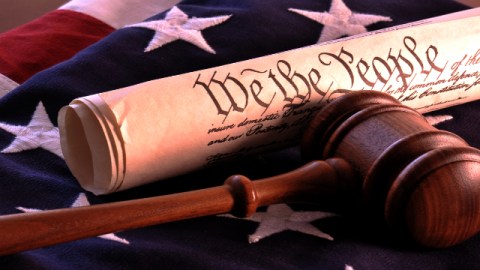The Founding Fathers On Mitt Romney

In a Big Think interview from 2007, Romney cites the founding fathers as some of his role models. But what would the founding fathers think of some of Romney’s ideas? Here we take a look some of the clips from that interview and see whether George Washington and Thomas Jefferson might have agreed with 2007 Romney on certain issues.
Issue 1: The Two Party System
In his famous farewell address in 1796, George Washington wrote, “The common and continual mischiefs of the spirit of party are sufficient to make it the interest and duty of a wise people to discourage and restrain it.”
Here Romney says that multiple parties would lead to a minority party’s wielding a disproportionate amount of power in the electoral process. Instead, he believes the “Republican tent needs to be big enough to encompass a majority of the people of this great country.”
Washington, on the other hand, believed parties to be a consolidation of the vices of the masses, and a single, giant GOP tent might just be a perfect example of that (not that a single, giant Democratic tent would be any more pleasant). Let’s also not forget the obvious dangers of a single majority party.
Issue 2: Morality in Government
In a letter to Thomas Law in 1814, Thomas Jefferson wrote, “How necessary was the care of the Creator in making the moral principle so much a part of our constitution as that no errors of reasoning or of speculation might lead us astray from its observance in practice.”
Jefferson was a Deist and did not believe in a material God (although he did refer to himself as Christian in letters to Benjamin Rush), however even he recognized government’s duty to further the evolution of society, both physically and spiritually.
Here he would have agreed with Romney, believing in a Creator himself and its permeating presence, unlike many ardent church-state separatists. No one, however, can argue that a society with morality, from whatever source, is worse than one without.
Issue 3: American Foreign Policy
Again, from Washington’s farewell address: “Why quit our own to stand upon foreign ground? Why, by interweaving our destiny with that of any part of Europe, entangle our peace and prosperity in the toils of European ambition, rivalship, interest, humor or caprice?”
Romney expresses clear support of going into Iraq – an endorsement he later reversed in 2011, stating that the United States “obviously would not have gone in” if it were clear that Iraq did not possess weapons of mass destruction. Oddly enough, UN inspectors had declared that Iraq did not possess WMD’s much earlier in the decade, and Romney still supported the war in 2008. A decade later, the United States is very much interwoven into the political destiny in Iraq thanks to faulty intelligence and a failure to listen to real intelligence – something I am sure George Washington would have frowned upon.





